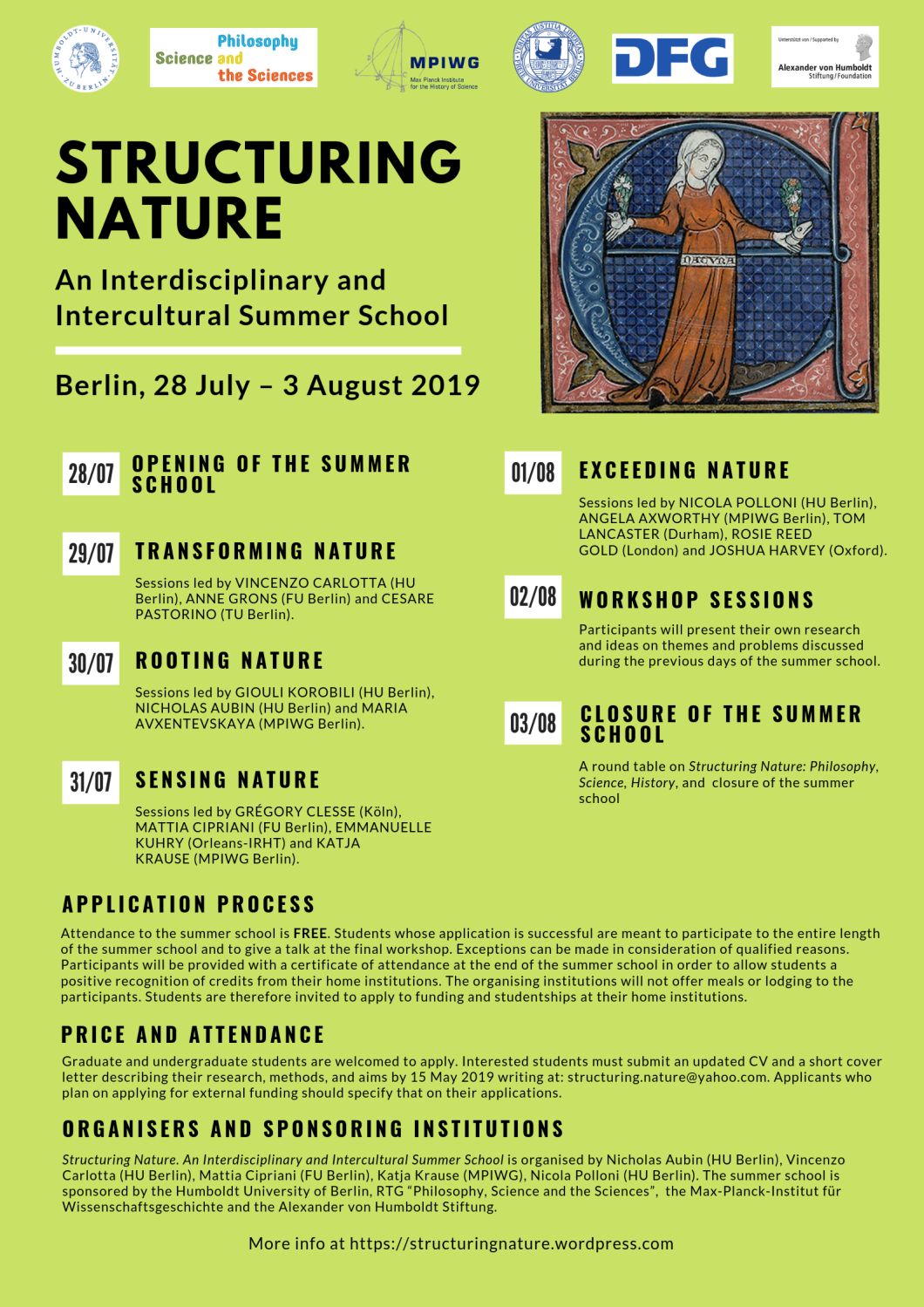
Reflecting about the leading question of the summer school whether nature structures our own thinking of nature, or whether our thoughts structure do structure the nature we perceive, and about the discussions we had during the summer school, I came to think that both the structure and the nature emerge from the same process of objectification. Nature and structure are generated in the same practices. In my anthropological understanding, there is no world outside our perception, there is no world out there before these processes. This is not to say that everything is only about human perception and that there does not exist an agency of materiality, but it is to emphasize these processes in which nature is enacted and to pay closer (academic) attention to those.
Anna Heitger, Berlin
During the one-week summer school in Berlin, I gained many experiences by interacting with first-class and ambitious young scholars who are working on pre-modern concepts of nature. The discussions I had shall directly flow into my scholarly results, insofar there is a need to sharpen our modern notion of nature and look with new eyes to it by bringing in premodern concepts. In this respect, the summer school was a unique and invaluable experience which shall point to a fruitful academic discourse in the future. I thank the organizers for their great job.
Thomas Seissl, Vienna
The Structuring Nature summer school was a glimpse of what I’d like more of academia to be. Interaction was facilitated between people from different disciplines on common themes and cross-bred questions. The organizers thus created not only a fruitful environment for interesting research, but also a less alienated and more cooperative approach, allowing for a more reflective attitude towards the things we as scholars spent most of our lives doing. I walked away from the program inspired to follow its example.
Niek Kerssies, Nijmegen
Reflections on preparatory readings, talks and discussions during the interdisciplinary and intercultural summer school “Structuring Nature” illustrate emphatically how traditional structures of history, disciplinary boundaries, and the restrictive concept of a modern idea of “science” limit the view on our perspective on nature. For my own project, such constraints emerge most prominently regarding rather strict and artificial distinctions between medieval and Renaissance art, their functions, ontological intentions, capacities, and sources. Consequently, it seems desirable to define more flexible “gravitational fields” encompassing the proper subject, which demand more interdisciplinary approaches and collaborations.
Gerd Micheluzzi, Vienna
The summer school brought together many perspectives on nature and how people saw nature and different parts of it, i.e. plants. My research tries to reconstruct the particular views of early modern botanists on nature. The presentations of the summer school opened my mind to new aspects of the history of nature and the history of science. Especially with the presentations of the research on pharmacological use and pharmacological prescriptions, with herbal and vegetable ingredients as well as the particular Greek and Roman authors’ understanding of plants, I gained knowledge of ancient dealing with plants.
Niklaas Görsch, Lübeck
My work connects to many of the themes that were discussed in the school, but on a more social than practical level. It is easy to see in these debates how the structure of nature and other philosophical and scientific topics are up for debate and are not yet cemented as complete treatises. In this way, debates such as this show how early intellectuals were attempting to codify and create treatises that would attest to a larger world view about nature. In other ways it intersects with ideas about what nature means to humankind, as many of the debates here are trying to understand the nature of man, such as virtue, something that I was shocked to see is absent from many other debates about nature discussed throughout the school. This leads me to question larger trends of how peoples throughout history define nature and whether they include mankind as part of nature itself or separate. Or if in fact nature takes on different meanings in regard to human nature vs. the natural world.
Jordan Cohen, University of California